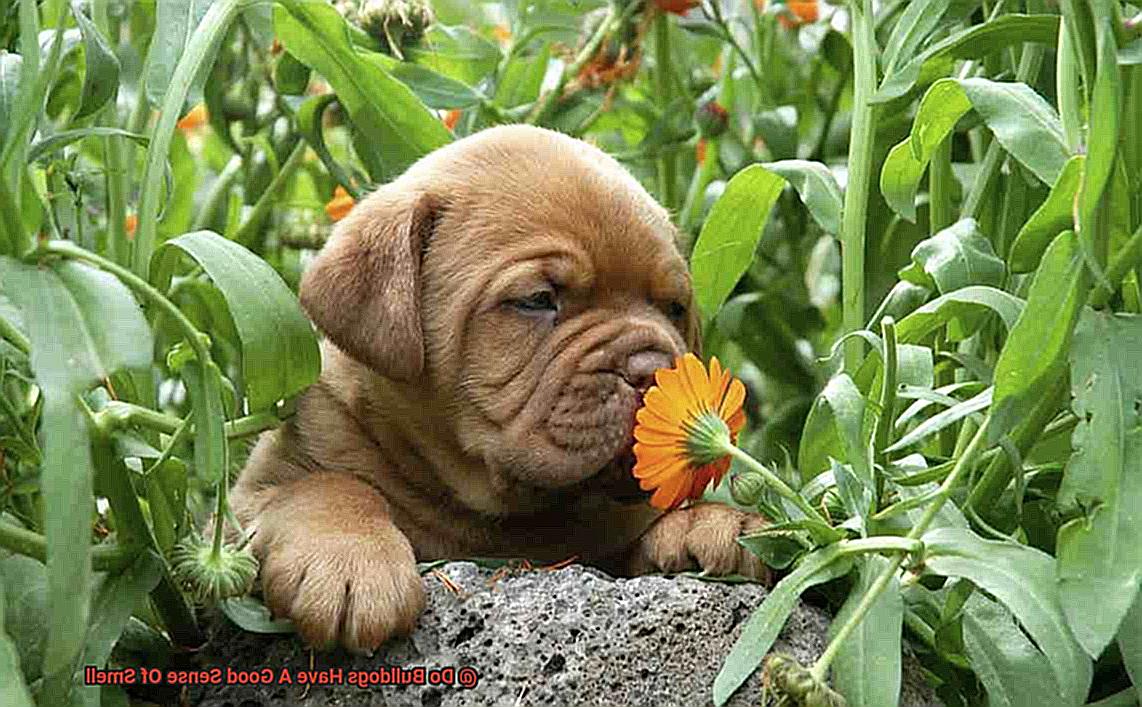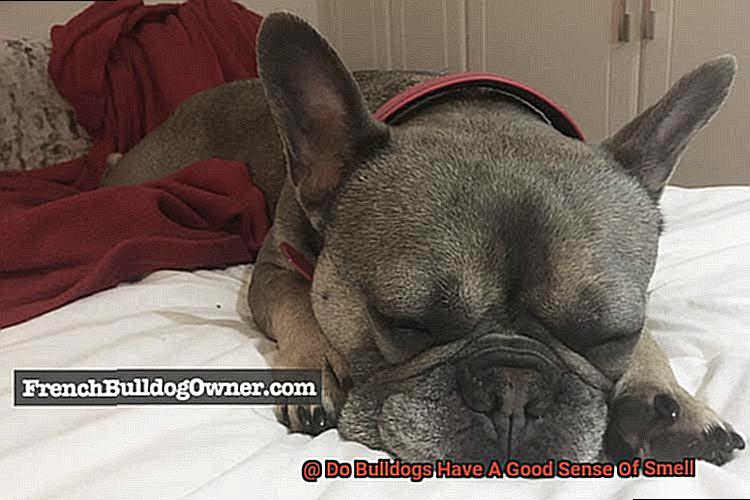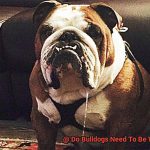Do Bulldogs Have A Good Sense Of Smell?
Picture this: a bulldog, with its wrinkled face and snorts that could rival a symphony of snuffles. These lovable canines have stolen the hearts of dog lovers worldwide. But amidst their undeniable charm, there lingers a question: do bulldogs possess an exceptional sense of smell? Prepare yourselves, fellow dog enthusiasts, as we embark on an olfactory expedition to uncover the truth behind bulldogs’ sniffing abilities.
When you think of scent hounds, bulldogs may not be the first breed that springs to mind. After all, they’re more known for being companions rather than working dogs. Originally bred for bull-baiting, these sturdy pups have since transformed into affectionate family pets. However, hidden beneath those adorable droopy expressions lies an olfactory system that’s nothing short of extraordinary.
Anatomy of a Bulldog’s Nose and Its Impact on Smell
Contents
- 1 Anatomy of a Bulldog’s Nose and Its Impact on Smell
- 2 How Does a Bulldog’s Sense of Smell Compare to Other Breeds?
- 3 Can Bulldogs Detect Familiar Scents?
- 4 Training Exercises to Enhance a Bulldog’s Sense of Smell
- 5 The Limitations of a Bulldog’s Olfactory Abilities
- 6 Search and Rescue Dogs vs Bulldogs: Which Have the Better Sense of Smell?
- 7 Factors That May Affect a Bulldog’s Ability to Smell
- 8 Conclusion
When it comes to our furry friends, French Bulldogs have a distinctive and adorable appearance that sets them apart from other dog breeds. One of the most noticeable features is their unique nose shape. In this article, we will explore how the anatomy of a bulldog’s nose impacts their sense of smell, providing insights into why they may not be known for their exceptional olfactory abilities.
The Anatomy of a Bulldog’s Nose:
A bulldog’s nose is characterized by being pushed back, flattened, and having a shortened snout. This specific nose shape is known as a brachycephalic nose. While it gives them their signature look, it also affects their sense of smell in several ways.
Limited Airflow:
The flattened and compressed shape of a bulldog’s nose restricts the amount of air that can pass through their nasal passages. This means they may not be able to inhale as much scent as dog breeds with longer snouts. Additionally, bulldogs have narrower nasal cavities due to their compact facial structure, further limiting airflow and the ability to detect scents effectively.
Olfactory Receptors:
The lack of depth in a bulldog’s nasal cavity may also impact their olfactory receptors. These receptors are responsible for detecting and interpreting different smells. Limited space in the nasal cavity could result in fewer olfactory receptors, potentially affecting their sense of smell.
Sense of Smell in Bulldogs:
Despite these anatomical limitations, bulldogs still possess a sense of smell. While it may not be as refined or sensitive as other breeds, they are capable of detecting certain scents, especially those that are strong or close in proximity.
Food Detectives:
Bulldogs are often described as having a keen sense of smell when it comes to food. Their ability to sniff out treats or meals is notable, and many owners rely on their bulldog’s nose to locate hidden treats during training exercises.
Individual Variations:
It’s important to note that each bulldog is unique, and individual variations may exist in terms of their sense of smell. Some bulldogs may have a relatively better sense of smell compared to others within the breed.
Factors Influencing Sense of Smell:
The anatomy of a bulldog’s nose does not solely determine their sense of smell. Factors such as genetics, health conditions, and environmental influences can also impact their olfactory abilities.
How Does a Bulldog’s Sense of Smell Compare to Other Breeds?
Today, we’re diving into the fascinating world of our furry friends’ sense of smell. While French Bulldogs may not be renowned for their exceptional olfactory abilities, they still possess a functional nose that allows them to navigate and explore the world through scents. So, let’s sniff out the details and compare their sniffs to other breeds.
Comparing Bulldogs’ Sense of Smell:
Average Sense of Smell:
Bulldogs have a sense of smell that is considered average compared to other dog breeds. While they may not win any scent-tracking contests, they can rely on their olfactory abilities to navigate their surroundings effectively.
Snout Structure:
The unique structure of a bulldog’s snout, with its short length and pushed-in face, can impact their sense of smell. The nasal passages may not allow for optimal airflow, resulting in a slightly diminished sense of smell compared to breeds with longer snouts.
Functional Abilities:
Despite these limitations, bulldogs still possess a functional sense of smell. They can track and locate objects or individuals using their nose, albeit not as proficiently as breeds specifically bred for scent work.
Individual Variations:
Just like humans, each bulldog’s sense of smell can vary regardless of breed. Factors like genetics, training, and overall health can influence their olfactory abilities. Some bulldogs may surprise you with an acute sense of smell, while others may have limitations due to health issues or breeding practices.
Comparing Bulldogs to Other Breeds:
Bloodhounds and Basset Hounds:
Breeds like Bloodhounds and Basset Hounds are known for their exceptional scent-tracking abilities. Their long ears and droopy skin help trap scents around their face, giving them an advantage in following scent trails.
German Shepherds and Beagles:

German Shepherds and Beagles are often used in police or search and rescue work due to their well-developed sense of smell. Their noses are finely tuned to detect a wide range of scents, making them top contenders in scent-related tasks.
Conclusion:
While French Bulldogs may not be at the forefront of the canine olfactory world, they still possess a functional sense of smell that allows them to explore and interact with the world through scents. Remember, every dog is unique, so it’s essential to appreciate and care for your bulldog’s individual strengths and limitations. So, next time you see your Frenchie sniffing around, take a moment to appreciate their nose for adventure.
Can Bulldogs Detect Familiar Scents?
You might think that bulldogs, with their adorable wrinkled faces and squished noses, wouldn’t be able to sniff out familiar scents like other dogs. But let me tell you, they’ve got a nose that can rival even the best of ’em.
Bulldogs are part of a long lineage of dogs who have been bred to have certain physical traits. These traits, like their wrinkled face and pushed-in nose, give them their unique appearance but don’t necessarily hinder their sense of smell. In fact, bulldogs, like all dogs, have an incredible sense of smell that puts our human sniffers to shame.

You see, dogs have up to 300 million olfactory receptors in their noses. That’s a whole lot more than the measly 6 million we humans have. It’s like comparing a bulldog’s sense of smell to a superhero’s superpower. Their snouts are built for sniffing, and they can detect specific odors even at incredibly low concentrations.
But it’s not just about the numbers. Bulldogs have been known to use their scent detection skills in various tasks throughout history. Some bulldogs have been trained as search and rescue dogs, using their keen sense of smell to locate missing persons or survivors in disaster situations. Imagine having a furry hero like that by your side.
Bulldogs have also been employed as detection dogs, sniffing out illegal substances or explosives. It’s amazing how they can differentiate between different smells and help keep us safe. So next time you see a bulldog strutting its stuff with its nose in the air, remember that it’s not just a cute face – it’s a scent-sational detective.
Even in a domestic setting, bulldogs can show off their scent detection skills. Many owners have reported instances where their bulldog recognized the scent of a family member or close friend even before they entered the house. Talk about having a built-in welcome committee.
But let’s not forget that each bulldog is unique, and their abilities may vary from one dog to another. Genetics, health conditions, and environmental factors can all play a role in their olfactory capabilities. So while your bulldog might not be breaking any records in the scent detection world, they still have a nose that can sniff out familiar scents with accuracy.
Training Exercises to Enhance a Bulldog’s Sense of Smell
Have you ever wondered how bulldogs with their adorable squished noses and wrinkled faces can have such an impressive sense of smell? Well, these furry detectives are equipped with up to 300 million olfactory receptors in their snouts, making them true scent-sational superheroes. While bulldogs may have a moderate sense of smell compared to other breeds, there are training exercises that can help enhance their olfactory abilities. In this article, we will explore some fun and effective exercises to boost your French Bulldog’s sense of smell.
Scent Work Game:
The scent work game is a fantastic way to engage your bulldog’s sense of smell. Hide treats or toys in various locations and encourage your furry friend to use their nose to find them. Start with easy hiding spots, gradually increasing the difficulty as your bulldog becomes more proficient. This game not only enhances their olfactory skills but also provides mental stimulation and builds their problem-solving abilities.
Scent Discrimination Game:
In the scent discrimination game, you introduce different scents, such as essential oils or food extracts, and teach your bulldog to differentiate between them using their sense of smell. Begin with two scents and gradually add more as your dog becomes adept at distinguishing between them. This exercise sharpens their olfactory senses and strengthens their ability to detect specific scents.
Nose Work Classes or Activities:
Enrolling your bulldog in nose work classes or activities specifically designed to engage their olfactory senses can be highly beneficial. These classes often include searching for hidden objects or navigating scent trails. They provide structured training environments where your furry friend can hone their sniffing skills under the guidance of professional trainers.
Incorporate Nose Work into Daily Walks:
Transform your routine walks into scent-focused adventures by allowing your bulldog more freedom to explore different smells along the way. Instead of just focusing on physical exercise, let them use their nose to sniff out interesting scents. You can also incorporate specific scent-focused activities during the walk, such as hiding treats for your bulldog to find, making it an enjoyable and enriching experience for both of you.
Puzzle Toys and Interactive Feeders:
Engage your bulldog’s sense of smell during playtime by using puzzle toys or interactive feeders that require them to use their nose to find hidden treats. These toys stimulate their natural instincts and encourage them to solve puzzles to access the rewards. Not only will this enhance their olfactory skills, but it will also provide mental stimulation and prevent boredom.
The Limitations of a Bulldog’s Olfactory Abilities
We all know our beloved Frenchies are packed with personality, but when it comes to their sniffer skills, they have a few limitations. In this blog post, we’ll dive into the fascinating world of a bulldog’s olfactory abilities and explore the factors that contribute to their sniffing struggles. So grab a cup of coffee and let’s get sniffing.
Short Snouts: A Sniffing Setback
Less Olfactory Receptor Cells, Less Sensitivity
Did you know that bulldogs have fewer olfactory receptor cells than some other dog breeds? These cells are the superheroes responsible for detecting and interpreting different smells. With fewer of these cells, bulldogs might not have the same sensitivity to odors as their furry counterparts. But don’t worry, they can still sniff out some delicious treats if given the chance.
Wrinkles and Folds: Odor Traps.
Those adorable wrinkles and folds on your Frenchie’s face aren’t just for show—they can actually trap and hold onto odors. This can make it tricky for them to differentiate between different scents. So next time you’re wondering why your bulldog seems a bit confused during a scent-based game, remember it’s all those folds playing hide-and-seek with the smells.
Respiratory Issues: A Sniffing Struggle
Bulldogs are notorious for their respiratory issues, like the brachycephalic airway syndrome. This condition can further impede their sense of smell by causing breathing difficulties and reduced airflow through the nasal passages. It’s like trying to smell a bouquet of roses with a stuffy nose—challenging, right?
Embracing Their Sniffing Superpowers
Even with these limitations, bulldogs still have a sense of smell, just not as strong or acute as some other breeds. While they might not excel in scent detection tasks like search and rescue missions, they can still use their sniffer skills in everyday situations. They can find food, recognize familiar scents, and even detect potential dangers. So let’s give them some credit for their sniffing superpowers.
Search and Rescue Dogs vs Bulldogs: Which Have the Better Sense of Smell?
When it comes to comparing the sense of smell between search and rescue dogs and bulldogs, it’s important to consider their different breeding and training purposes. While search and rescue dogs are highly trained to utilize their olfactory abilities for life-saving missions, bulldogs are not typically bred or trained for their sense of smell. In this article, we will explore the factors that contribute to a dog’s sense of smell and discuss why search and rescue dogs generally have a better sense of smell compared to bulldogs.
Factors Affecting a Dog’s Sense of Smell:
Training Focus:
- Search and rescue dogs undergo extensive training specifically aimed at enhancing their olfactory capabilities. They are trained to focus solely on using their sense of smell to locate missing persons or detect substances.
- Bulldogs, on the other hand, are primarily bred for their muscular build and appearance rather than their olfactory abilities. The lack of specific training in scent detection may impact their ability to use their sense of smell effectively.
Genetics:
- While each individual dog may have variations in their sense of smell, certain breeds are genetically predisposed to having a more sensitive nose.
- Search and rescue dogs often belong to breeds known for their exceptional olfactory capabilities, such as Bloodhounds or German Shepherds. Bulldogs, however, do not have the same genetic background focused on scent detection.
Anatomical Considerations:
- Bulldogs have relatively large nasal cavities compared to some other breeds, which suggests that they may have the potential for a decent sense of smell.
- However, their short snouts and respiratory issues can limit air intake, potentially affecting the efficiency of scent detection.
Factors That May Affect a Bulldog’s Ability to Smell
Today, we’re going to sniff out some interesting facts about our furry friends’ sense of smell. While Frenchies have a decent sense of smell, it’s essential to understand that they may not have the same sniffing skills as bloodhounds or beagles. Let’s explore some factors that can affect your bulldog’s ability to pick up scents.
- Nose Shape: Bulldogs have a unique, adorable feature – their short, flattened noses. However, this brachycephalic trait can lead to narrower nasal passages and restricted airflow. As a result, their sense of smell may not be as sharp as other breeds with more elongated snouts. The reduced surface area of the olfactory epithelium, responsible for detecting scents, may also contribute to this.
- Wrinkled Skin: Ah, those irresistible wrinkles. While they add charm to our Frenchies’ faces, they can collect dirt, debris, and moisture. These little crevices may obstruct their nasal passages and potentially affect their ability to detect smells accurately. Regular cleaning and proper hygiene can help keep those wrinkles smelling fresh.
- Respiratory Issues: Bulldogs are prone to respiratory problems due to their brachycephalic features. These breathing difficulties can impact their ability to take deep sniffs and fully utilize their sense of smell. Keep an eye on your Frenchie’s breathing patterns and consult your vet if you notice any persistent issues.
- Health Conditions: Certain diseases or infections affecting the respiratory system or nasal passages can impair a bulldog’s olfactory abilities. Allergies or sinus problems can also cause nasal congestion, making it challenging for them to pick up scents effectively.
- Environmental Factors: Extreme weather conditions like high humidity or cold temperatures can alter the molecules in the air, making it harder for your bulldog to detect scents. Additionally, strong odors or pollutants in the environment may overpower or confuse their olfactory senses.
- Genetics: Just like humans, different bulldogs can have varying degrees of olfactory ability based on their genetic makeup. Some individuals may have a more developed sense of smell than others within the breed.
Remember, understanding these factors can help you better appreciate your bulldog’s unique abilities and limitations. While they may not be the top scenting dogs, they make up for it with their lovable personalities and companionship. So, next time your Frenchie sniffs something interesting on your walk, give them a pat on the back (or a scratch behind those adorable ears) for trying their best.
Conclusion
Bulldogs, renowned for their distinctive appearance and lovable nature, may not be known for their exceptional sense of smell.
However, don’t let their wrinkled faces fool you – they do possess a decent olfactory ability. While not on par with scent hounds like Bloodhounds or Beagles, bulldogs can still pick up various scents and use their noses to navigate the world around them.
Their sense of smell may not be as sharp or refined as other breeds, but it’s certainly nothing to scoff at.




